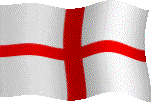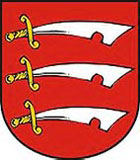Encyclopédie Marikavel-Jean-Claude-EVEN/Encyclopaedia/Enciclopedia/Enzyklopädie/egkuklopaideia

England Bro Saoz |
Bradwell On the Sea / Juxta Mare Othona |

Essex Bro-Saoz ar Reter |
| page ouverte en 2001 |
forum de discussion
* forum du site Marikavel : Academia Celtica |
dernière mise à jour 28/05/2012 10:44:46 |
![]()
|
Définition : Angleterre; comté d'Essex. l'ancien fort romain d'Othona, au nord de l'embouchure de la Tamise, en Essex. |
|
![]()
|
Extrait de la carte Map of Roman Britain, par Ordnance Survey |
![]()
|
Histoire : Ancien camp romain, attribué selon la Notitia Dignitatum (fin du IVè siècle) à : Praepositus numeri Fortensium, qui semble être une unité de cavalerie Fortenses originaire d'Afrique du Nord (H.M Carter, Fort of Othona, p 6). Le secteur est tombé aux mains des Anglo-saxons entre 525 et 530. JCE : L. Quicherat & A. Develuy, Dict. Latin-français, dit que l'appellation Fortensis est le surnom d'une partie de la Dalmatie, et que Fortenses désigne ceux qui sont cantonnés dans cette Dalmatie Fortensis. |
![]()
|
Étymologie : * A.LF. Rivet & Colin Smith , p 434-435 : " DERIVATION. This is a very problematic name. The eévidence of ND is supplemented, exceptionally, by a later form in Bede, who (III, 22) writes of St Cedd preaching to the East Saxons maxime in civitate quae lingua Saxonum Ythancaestir appellatur. St Cedd built his church at Bradwell in about 654, at the Roman fort and using its materials. It is usually assumed that Bede's Ythan- represents a continuation in Anglo-Saxon of Othona, perhaps of a variant *Othônia (Zachrisson (1927), 83), but Ekwall EPN (s.v. Bradwell) thinks it likely that Yppan is the genitive of a personal name *Yppa or *Yppe (fem.). It seems, however, that when we have such a degree of phonetic similarity, the fact that the two locations coincide (the church at the fort), a caestir name, and no more than a hypothetical Anglo-Saxon personal name (not commonly associated with caestir), there is every reason to postulate a probability of the continuation of the Romano-British name to Bede's tirne; and this probability is enhanced by the strong survival-rate of the names of the Saxon Shore forts. The phonetic difficulty is resolved by Fôrster FT 597 (note), at least for the vowels. He starts from an assumed British *Ottona, Latin Othona, whose stressed vowel would have evolved via *Opûn to Anglo-Saxon *Upïn > *Ypin, then to the form recorded by Bede; he cites the development of Latin coloia to Anglo-Saxon *cylen (Lindcyln) in support. This seems to accord with Jackson's discussion of thé development ofo in LHEB, although at 568-69 he seems to doubt Fôrster's *Ottàna on other grounds, that it has no clear etymology and leaves the -th- of the Latin form unexplained. There are other possibilities. A British *Ottona, of unknown etymology, might have been assimilated by Latin speakers to the Roman personal name Otho. This was a cognomen of the gens Salvia, its best-known member being M. Salvius Otho, briefly Emperor in A.D. 69. This name has been related to Greek ôSopca, whence the *th- spelling, though it is often written Otto also. British had no -th- [T] sound, and may not have entered into the later part of the transmission process at all; the name could have been made known by Latin speakers to early Germanie mercenaries, or could have survived among Latin speakers of south-east Britain and been transmitted to Anglo-Saxon settlers, its -th- being heard naturally by the latter as their p. If British is involved, we have noted that -th- [T] was not a sound which existed in it. The name cannot have had -t- written -th- by a medieval scribe (Othona), as did often happen, because original British -t- lenited (as Latin t was voiced to d in late Vulgar Latin) and is represented as d i Anglo-Saxon borrowings, e.g. *Anderitum > Andred, *Rutuna > Roden, which is not the case with the present name. However, original British -tt- does appear as -th- in later forms (LHEB 565), and could explain why a British *Ottona (scribally represented as Othona) would give, in the évolution of the sounds of British, an Anglo-Saxon Ythan- as Bede has it, though according to Jackson (LHEB 568) the dating of such a borrowing remains a problem". IIDENTIFICATION. The Roman fort at Bradwell-on-the-Sea ***** * Eilert Ekwall : Othona, var. Othana ND; Ythancaestir c 730 Bede; Y þanceaster c 890; OE.Bede; Effecestra DB; Bradwella 1194 P; Bradwell 1212 Fees. Pour cet auteur, le radical du nom donné par Bède et DB semble être plutôt basé sur un nom de personne germanique Yþþa ou Yþþe. Quant à Bradwell, il semble issu d'un nom ancien de la rivière près de laquelle se trouve le camp : la Bradwell, aujourd'hui la Blackwater. - ALF. Rivet & C. Smith ne s'accordent pas avec E. Ekwall, car ils estiment que les formes données par Bède, Ythan- sont la continuation de la forme latine Othona. |
![]()
|
Document réalisé par la paroisse de Saint Peter Ad Murum; Bradwell-Juxta-Mare Obtenu lors d'une visite sur les lieux en 1983 |
![]()
|
Liens électroniques des sites Internet traitant de Bradwell-on-Sea / Othona : * lien communal : * forum du site Marikavel : Academia Celtica hast buan, ma mignonig go fast, my little friend |
![]()